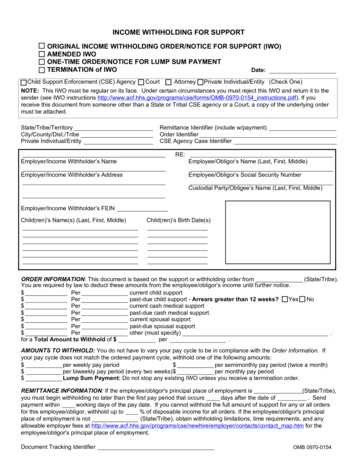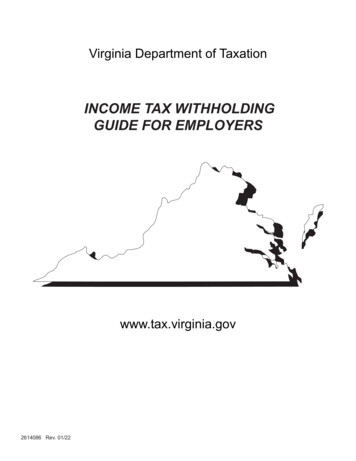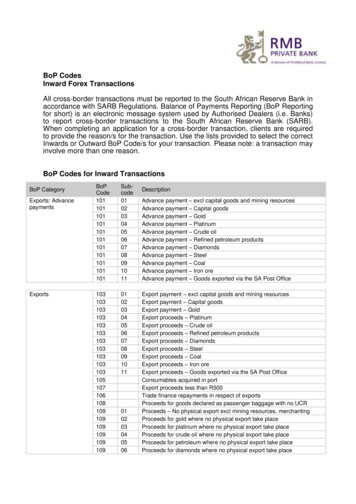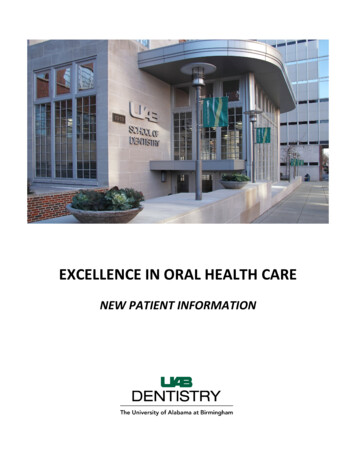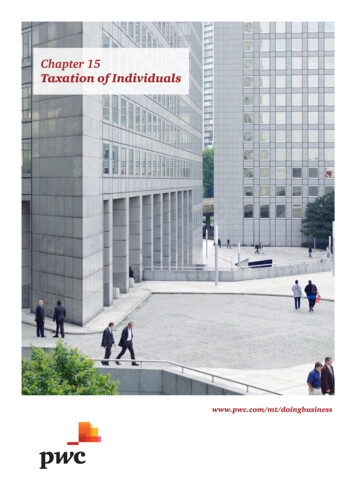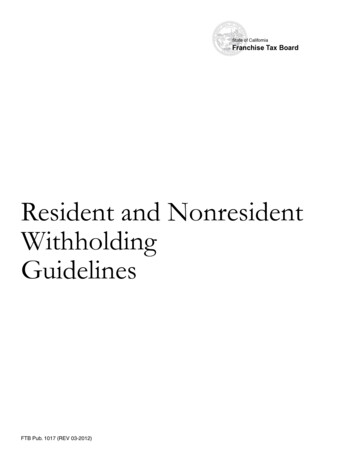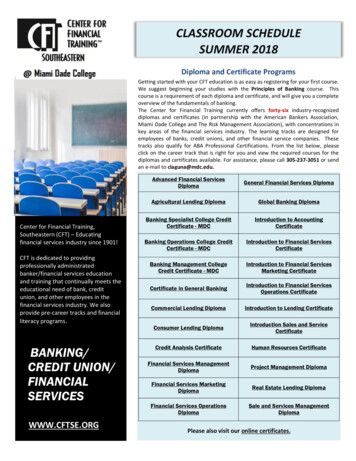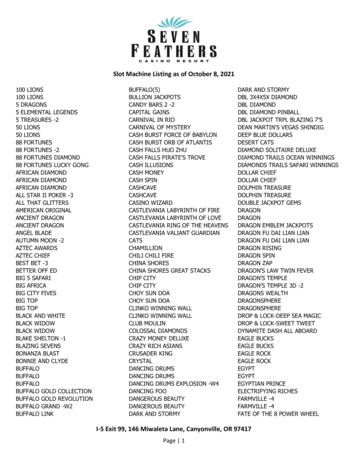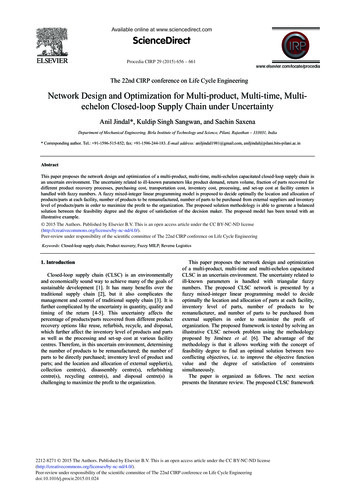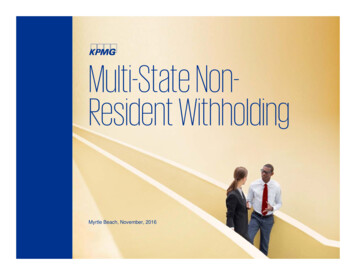
Transcription
Multi-State NonResident WithholdingMyrtle Beach, November, 2016
Notice— The following information is not intended to be “written advice concerning one or morefederal tax matters” subject to the requirements of section 10.37(a)(2) of TreasuryDepartment Circular 230.— The information contained herein is of a general nature and based on authorities thatare subject to change. Applicability of the information to specific situations should bedetermined through consultation with your tax adviser. 2016 KPMG LLP, a Delaware limited liability partnership and the U.S. member firm of the KPMG network of independent member firms affiliated with KPMG InternationalCooperative (“KPMG International”), a Swiss entity. All rights reserved. NDPPS 6002182
Welcome
With you todayFredBasehore,SeniorManagerMananShah, SeniorManagerKPMG AtlantaRaleighEmployment Tax Services(919)(404) om 2016 KPMG LLP, a Delaware limited liability partnership and the U.S. member firm of the KPMG network of independent member firms affiliated with KPMG InternationalCooperative (“KPMG International”), a Swiss entity. All rights reserved. NDPPS 6002184
Multistatewithholding
Payroll issues with multistate nonresident withholding— Payroll tax compliance is one of the primary concerns expressed when addressingmultistate withholding requirements on regular wages, supplemental wages, andequity-based compensation.- Should we report?- Should we withhold?- Where should we report?- How much to report?- How much to withhold?- When to report?- Timeliness of tax remittance to authorities- Who is legally liable – employer, employee, or both? 2016 KPMG LLP, a Delaware limited liability partnership and the U.S. member firm of the KPMG network of independent member firms affiliated with KPMG InternationalCooperative (“KPMG International”), a Swiss entity. All rights reserved. NDPPS 6002186
State unemployment taxesThe basics— State unemployment insurance (SUI) taxes assessed to all for-profit employers.— Tax structure used to finance the unemployment claims system.— Not-for-profit employers generally reimburse for SUI claims filed.— Taxes are used to replenish employer accounts after benefits are paid to separatingemployees.— Tax payments are generally based on three factors:- Employer’s taxable wages (vary by state)- Health of the state’s UI tax reserves, and- Employer’s assigned SUI tax rate (varies by employer, dependent upon benefitspaid, and other state factors) 2016 KPMG LLP, a Delaware limited liability partnership and the U.S. member firm of the KPMG network of independent member firms affiliated with KPMG InternationalCooperative (“KPMG International”), a Swiss entity. All rights reserved. NDPPS 6002187
State unemploymentWage sourcing rules— General rules- SUI wages should generally be reported in the state in which the employeeprimarily perform services.- SUI wages are generally sourced to one state per calendar year unless there is achange in an employee’s primary work location.— Sourcing rules (four prong test)1. Localization of services – State in which a majority of services are performed,provided that services provided outside of that state are incidental.2. Base of operations – If services are regularly performed in more than one state,wages should be sourced to the state where the employee maintains a base ofoperations if some services are performed in that state.3. Direction and control – If an employee lacks a true base of operations, wagesshould be sourced to the state from which the employee receives direction andcontrol if some services are performed in that state.4. Residence – If none of the other factors apply, source SUI wages to the employee’sstate of residence. 2016 KPMG LLP, a Delaware limited liability partnership and the U.S. member firm of the KPMG network of independent member firms affiliated with KPMG InternationalCooperative (“KPMG International”), a Swiss entity. All rights reserved. NDPPS 6002188
State income tax withholdingThe basics— Requirements and obligations of employer are well defined in most cases.— The employer is ultimately responsible for proper withholding and reporting of theiremployee’s state-sourced income.— Sourcing rules (generally)- Income should be sourced to state or states where employee performs services.- Non-resident employees traveling to different states should have state income tax(SIT) withheld in those states.- Equity compensation is typically based on a look back period taking into accountwhere the money was earned at a given point (e.g., upon vesting) rather thanwhere it is paid out. 2016 KPMG LLP, a Delaware limited liability partnership and the U.S. member firm of the KPMG network of independent member firms affiliated with KPMG InternationalCooperative (“KPMG International”), a Swiss entity. All rights reserved. NDPPS 6002189
Non-resident state income tax withholding— In general, employers are required to withhold SIT on non-residents of a state ifservices are or were performed by the employee in that state.— Exceptions/limitations:- De minimis rules of certain states (not always applicable to equity compensation)- Reciprocal agreements between states- Exemption certificate allocation 2016 KPMG LLP, a Delaware limited liability partnership and the U.S. member firm of the KPMG network of independent member firms affiliated with KPMG InternationalCooperative (“KPMG International”), a Swiss entity. All rights reserved. NDPPS 60021810
State income tax withholdingSome states havede minimisthresholds(NY, GA, etc.) thatmust be identifiedand monitored.Ignorance isno defense.Companyofficers couldbe liable forunderwithheldamounts.Whatemployersneed toknowPayroll systemsmay be ineffectivein handling.Audits may beaggressive incertain states. 2016 KPMG LLP, a Delaware limited liability partnership and the U.S. member firm of the KPMG network of independent member firms affiliated with KPMG InternationalCooperative (“KPMG International”), a Swiss entity. All rights reserved. NDPPS 60021811
General withholding exceptions/qualifiers— Reciprocity:- Work state/resident state agreements- Specific filing requirements— Exemption certificates:- Many states allow for allocation of source income based on past history and futureexpectations.- Can apply to equity compensation in many cases- Must obtain and retain 2016 KPMG LLP, a Delaware limited liability partnership and the U.S. member firm of the KPMG network of independent member firms affiliated with KPMG InternationalCooperative (“KPMG International”), a Swiss entity. All rights reserved. NDPPS 60021812
What is reciprocity?— A reciprocal agreement allows residents of one state to request exemption from taxwithholding in another (reciprocal) state.— For example, New Jersey and Pennsylvania have a reciprocal agreement, also calledreciprocity. This means that a New Jersey resident who works in Pennsylvania can asktheir employer to stop withholding Pennsylvania taxes, saving them the trouble (andexpense!) of having to file a PA return in addition to their NJ return.— The reverse would also be true; that is, a Pennsylvania resident who works inNew Jersey can elect to have their employer stop withholding for New Jersey, whichmeans they’d only have to file a state return for Pennsylvania. 2016 KPMG LLP, a Delaware limited liability partnership and the U.S. member firm of the KPMG network of independent member firms affiliated with KPMG InternationalCooperative (“KPMG International”), a Swiss entity. All rights reserved. NDPPS 60021813
States with reciprocity agreementsIllinoisIndianaIowaKentuckyMaryland— Iowa,Kentucky,Michigan,Wisconsin— Kentucky,Michigan,Ohio,Pennsylvania,Wisconsin— Illinois— Illinois,Indiana,Michigan,Ohio, Virginia,West Virginia,Wisconsin— WashingtonDC,Pennsylvania,Virginia,West VirginiaMichiganMinnesotaMontanaNew JerseyNorth Dakota— — Michigan,North Dakota— North Dakota— Pennsylvania— Minnesota,MontanaOhioPennsylvaniaVirginiaWest VirginiaWisconsin— Indiana,Kentucky,Michigan,Pennsylvania,West Virginia— Indiana,Maryland, NewJersey, Ohio,Virginia, WestVirginia— WashingtonDC, Kentucky,Maryland,Pennsylvania,West Virginia— Kentucky,Maryland,Ohio,Pennsylvania,Virginia— Illinois,Indiana,Kentucky,Michigan 2016 KPMG LLP, a Delaware limited liability partnership and the U.S. member firm of the KPMG network of independent member firms affiliated with KPMG InternationalCooperative (“KPMG International”), a Swiss entity. All rights reserved. NDPPS 60021814
What is withholding de minimis?— In terms of State income tax, de minimis refers to the point at which withholdingsshould be initiated for a nonresident working in a state which taxes personal income.— Not all U.S. states levy income taxes, and there’s little consistency among nonresidentde minimis standards for those that do.— Some states base de minimis on the number of days worked (although the definition ofwhat counts as a workday has been controversial, others on the dollars earned or apercentage of total income derived from work in the state, still others using acombination of methods. 2016 KPMG LLP, a Delaware limited liability partnership and the U.S. member firm of the KPMG network of independent member firms affiliated with KPMG InternationalCooperative (“KPMG International”), a Swiss entity. All rights reserved. NDPPS 60021815
Non-resident withholding de minimis jurisdictionsAs of ALGALAFLAKHIStates with de minimis rules or exceptionsStates without de minimis rules or exceptionsStates with no withholding provisionSource: KPMG LLP Global Mobility Services 2016 KPMG LLP, a Delaware limited liability partnership and the U.S. member firm of the KPMG network of independent member firms affiliated with KPMG InternationalCooperative (“KPMG International”), a Swiss entity. All rights reserved. NDPPS 60021816
Equity awards and compensation— Basis for equity-based compensation typically spans multiple years— Employers required to allocate gain based upon time an employee performs servicesin a particular jurisdiction.— Many employers have not instituted procedures necessary to track employeemovements for equity-based compensation withholding purposes.— Highly compensated individuals, such as C-suite executives, travel to numerous stateswhile executing their responsibilities.— States are aware of such employee movements and are becoming more aggressive intheir enforcement efforts with respect to employer withholding.— Public corporations, private equity firms, financial institutions and non-U.S. basedcompanies with U.S. presence are key audit targets. 2016 KPMG LLP, a Delaware limited liability partnership and the U.S. member firm of the KPMG network of independent member firms affiliated with KPMG InternationalCooperative (“KPMG International”), a Swiss entity. All rights reserved. NDPPS 60021817
Legislative action has been slow 2016 KPMG LLP, a Delaware limited liability partnership and the U.S. member firm of the KPMG network of independent member firms affiliated with KPMG InternationalCooperative (“KPMG International”), a Swiss entity. All rights reserved. NDPPS 60021818
Non-resident withholdingCurrent legislation introduced— H.R. 2315, Mobile Workforce State Income Tax Simplification Act of 2015— S. 386, Mobile Workforce State Income Tax Simplification Act of 2015.— Senate and House bills are identical— Statutory framework- No state personal income tax on— “Wages or other remuneration,” earned by— “Employee” performing “employment duties,” except by:- Employee’s state of residence, or- State in which employee is “present” for more than 30 days- No state withholding or reporting rules apply unless taxable— If taxable, rules apply as of commencement of employment duties— UPDATE: on September 21 the House passed the latest version of thebill— It has not gone to the Senate yet and will likely not make it out ofcommittee (4% chance) 2016 KPMG LLP, a Delaware limited liability partnership and the U.S. member firm of the KPMG network of independent member firms affiliated with KPMG InternationalCooperative (“KPMG International”), a Swiss entity. All rights reserved. NDPPS 60021819
Some common internal tracking— Time and attendance application— Third party travel provider— Travel reimbursements (AP system)— What about you payroll system? 2016 KPMG LLP, a Delaware limited liability partnership and the U.S. member firm of the KPMG network of independent member firms affiliated with KPMG InternationalCooperative (“KPMG International”), a Swiss entity. All rights reserved. NDPPS 60021820
State withholding audits— What might they ask for?- Review of company expense reimbursement and travel policy- Review of payroll manual for company policy on taxation of mobile workforce- Review of payroll manual for company policy on taxation and reporting of stock andequity compensation- Review of employee expense records – specifically hotel and flight reimbursements- Review of any publicly available information as to major projects/events takingplace in the state- Review of executive calendars- Review of corporate jet logs/itineraries- Review of stock grant, vest, and exercise data relating to mobile workforce 2016 KPMG LLP, a Delaware limited liability partnership and the U.S. member firm of the KPMG network of independent member firms affiliated with KPMG InternationalCooperative (“KPMG International”), a Swiss entity. All rights reserved. NDPPS 60021821
State withholding audit activity (samples)— New York- Aggressive enforcement for almost a decade- Potential significant assessments especially on allocation of equity compensation— California- Aggressive since the mid-90s- San Francisco Payroll Expense Tax (being phased out)- New initiative for auditor hiring/training— Minnesota – Canceled WI reciprocity (effective: January 1, 2010)— Connecticut- Enacted New York’s de minimis regulations as their own- Uptick in Connecticut audits— Increase in audit activity in states that border a state with no personal income taxes- Massachusetts, Georgia, etc. 2016 KPMG LLP, a Delaware limited liability partnership and the U.S. member firm of the KPMG network of independent member firms affiliated with KPMG InternationalCooperative (“KPMG International”), a Swiss entity. All rights reserved. NDPPS 60021822
Multistate withholding risks and control obstacles— Potential risk associated with noncompliance- Audit risk- Public relations- Tax principal/penalty/interest assessments— Barriers to compliance- Time and expense system limitations- Third-party vendors unable to comply- Corporate culture- Employee impact- Employers cannot track employee movement on a daily basis- Inconsistent policies and procedures for monitoring a mobile workforce 2016 KPMG LLP, a Delaware limited liability partnership and the U.S. member firm of the KPMG network of independent member firms affiliated with KPMG InternationalCooperative (“KPMG International”), a Swiss entity. All rights reserved. NDPPS 60021823
Taking action— Identify stakeholders and discuss concerns— Identify and quantify exposure— Define plan to address 2016 KPMG LLP, a Delaware limited liability partnership and the U.S. member firm of the KPMG network of independent member firms affiliated with KPMG InternationalCooperative (“KPMG International”), a Swiss entity. All rights reserved. NDPPS 60021824
Key challengesProject ownership and stakeholdersIT— How can our systems bescalable, and truly global?Employee— How can I better understand my awardsand my tax liability?— How can I improve securityand privacy, inside andoutside our network?Internal audit— Are we maintainingappropriate controls overequity grants?— Are we creating a sufficientaudit trail?— How does moving abroad affect myawards?— Why can’t the process for exercising optionsand selling stock be straightforward?Business unit leaders— How can I reward high performersand attract talent with equity?HR— Are comp costs being allocatedproperly as employees move?— How do I maintain accurate, timely data?— Are our equity programs helping us acquireand retain talent around the world?— Can I reduce manual processing? Can Ioutsource equity administration and stillmaintain control over it?LegalCorp taxFinance and payroll— What should we report and withhold, andwhen? Who is legally liable for remittances?— How do we make sure we apply the rightaccounting treatment to awards?— Are we making the right financial disclosures?— How do we secureappropriate deductionsand credits?— How do we make sure that ourgrants consistently conform to ourplan terms?— How do we keep up with changinglaws and regulation around theworld and ensure compliance?— How do we handlemulticountrycombinations? 2016 KPMG LLP, a Delaware limited liability partnership and the U.S. member firm of the KPMG network of independent member firms affiliated with KPMG InternationalCooperative (“KPMG International”), a Swiss entity. All rights reserved. NDPPS 60021825
Narrowing the fieldHow to filter?All employeesBusiness travelersBusiness travelerswith potentialexposure 2016 KPMG LLP, a Delaware limited liability partnership and the U.S. member firm of the KPMG network of independent member firms affiliated with KPMG InternationalCooperative (“KPMG International”), a Swiss entity. All rights reserved. NDPPS 60021826
Closing thoughts on short term business visitor issuesPotential next steps— Evaluation/assessment- Identify states/countries and employees likely to have material mobile activity- Identify records/sources that provide indicators of activity— Compliance policy design- Determine processes- Methodology of data capture (travel records, employee data entry, etc.)- Real-time compliance- Communication and training to/for employees- Internal audit procedures— Practical issues/concerns- Phased roll-outs- IT/technology/security issues- Deployment timeframes— Legislative outlook (U.S.) – unclear 2016 KPMG LLP, a Delaware limited liability partnership and the U.S. member firm of the KPMG network of independent member firms affiliated with KPMG InternationalCooperative (“KPMG International”), a Swiss entity. All rights reserved. NDPPS 60021827
Non-resident workforce survey— Joint survey conducted by the American Payroll Association and KPMG— Survey results collected in November 2014— Over 1,100 respondents amongst 20 different industries 2016 KPMG LLP, a Delaware limited liability partnership and the U.S. member firm of the KPMG network of independent member firms affiliated with KPMG InternationalCooperative (“KPMG International”), a Swiss entity. All rights reserved. NDPPS 60021828
Question 1— Is U.S. non-resident state withholding/reporting a major or growing issue for yourorganization with respect to compliance and/or risk?23%36%Yes, it is a major issueYes, it is a growing issueNo, not viewed as a corporate risk41% 2016 KPMG LLP, a Delaware limited liability partnership and the U.S. member firm of the KPMG network of independent member firms affiliated with KPMG InternationalCooperative (“KPMG International”), a Swiss entity. All rights reserved. NDPPS 60021829
Question 2— Do you currently have procedures and/or technology in place to monitor U.S. employeework travel and remit/report taxes accordingly?Yes, we have technology in place tofacilitate tracking and taxation10%Yes, we have procedures in place totrack and tax accordingly29%36%Yes, we have both procedures andtechnology in place25%No, we do not track U.S.state-to-state travel 2016 KPMG LLP, a Delaware limited liability partnership and the U.S. member firm of the KPMG network of independent member firms affiliated with KPMG InternationalCooperative (“KPMG International”), a Swiss entity. All rights reserved. NDPPS 60021830
What questions do you have?AskHow 2016 KPMG LLP, a Delaware limited liability partnership and the U.S. member firm of the KPMG network of independent member firms affiliated with KPMG InternationalCooperative (“KPMG International”), a Swiss entity. All rights reserved. NDPPS 60021831
kpmg.com/socialmediaThe information contained herein is of a general nature and is not intended to address the circumstances of any particularindividual or entity. Although we endeavor to provide accurate and timely information, there can be no guarantee that suchinformation is accurate as of the date it is received or that it will continue to be accurate in the future. No one should act onsuch information without appropriate professional advice after a thorough examination of the particular situation. 2016 KPMG LLP, a Delaware limited liability partnership and the U.S. member firm of the KPMG network ofindependent member firms affiliated with KPMG International Cooperative (“KPMG International”), a Swiss entity.All rights reserved. NDPPS 600218The KPMG name and logo are registered trademarks or trademarks of KPMG International.
Ohio, Virginia, West Virginia, Wisconsin Maryland — Washington DC, Pennsylvania, Virginia, West Virginia Michigan — Illinois, Indiana, Kentucky, Minnesota, Ohio, Wisconsin Minnesota — Michigan, North Dakota Montana — North Dakota New Jersey — Pennsylvania North Dakota — Minnesota, Montana Ohio — Indiana,

